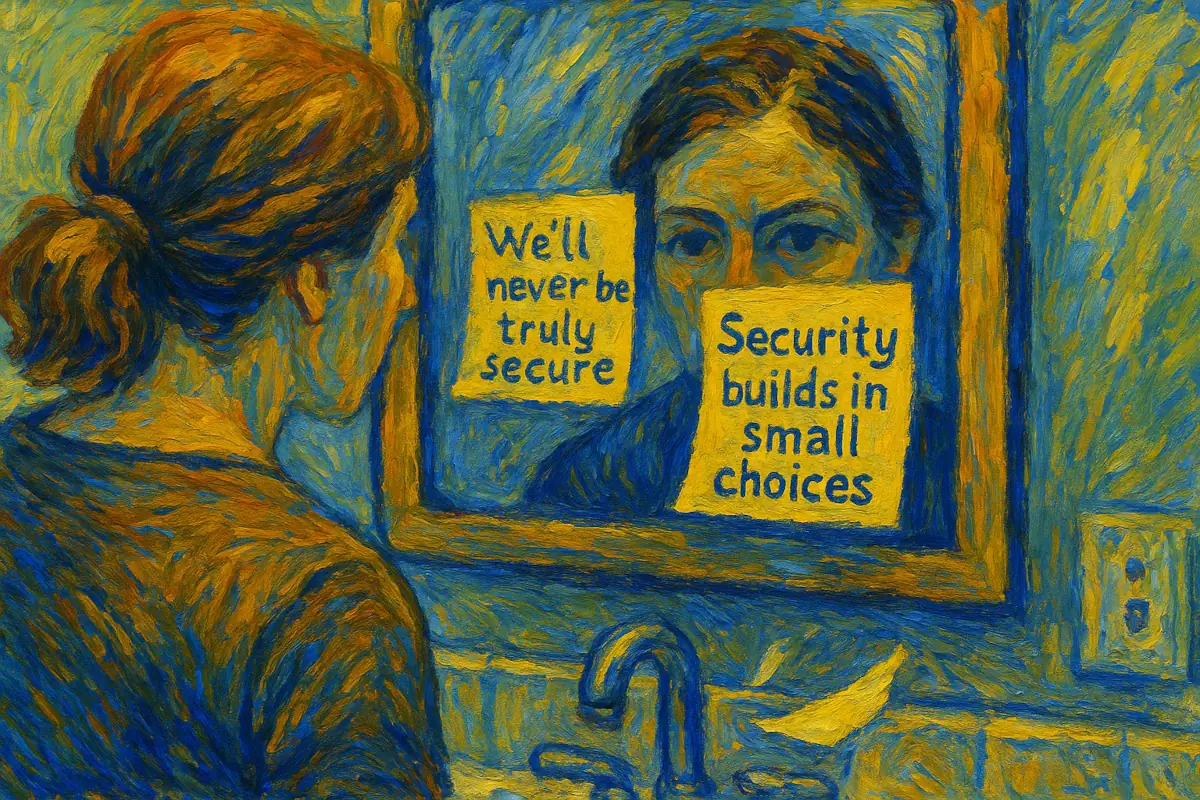The Script in Invisible Ink
The sound was small but deafening: beep… decline.
Heat climbed Elena’s neck. The line behind her rustled, carts edging forward, patience worn like a costume. Mateo’s fingers tightened around the blue-wrapped gum he’d wanted. Eight years old and bright as a match.
“Mom?” he whispered. “Is something wrong?”
She made her face calm. Calm was a survival skill.
“The card’s being weird,” she said lightly. “Let’s step over here a second.”
They shifted to the end of the counter near a rack of mints. Elena crouched, hands on her knees. “Remember our calm game?” she asked, voice low.
Mateo nodded.
She turned her palm outward, fingers lifted, and tapped the tiny hangnail corners on the nail edges that faced her body’s midline—index, middle, ring, little—then her thumb’s midline edge. Tiny taps, nothing to see. To them, it was a bridge.
Under her breath, barely air, she named what was true so her body could hear it:
“Even though my face is burning and I feel embarrassed, I accept how I feel and I’m here with you.”
“Even though I hate this moment, I’m open to it just being a moment.”
Mateo tapped his own midline nail edges, a small mirror. His shoulders dropped half an inch. The conveyor belt sighed on.
She tried the other card. It chirped approval, ordinary as rain.
Outside, the street smelled like rain on warm asphalt. They walked home under a flat gray sky, groceries heavier than they had any right to be.
“Are we in trouble?” Mateo asked after a block, voice quiet.
“No,” she said. Then, because she was learning not to lie about feelings: “That was scary for me. I felt embarrassed. The tapping helped.”
He considered, then pushed the gum into her hand. “You can have mine.”
She laughed. “We’ll share.”
At home, she lined milk and eggs in the fridge like soldiers, then flipped the electric bill face down to stop its stare. The envelope said what it always says in her head: You can’t pay… of course.
Her chest tightened like a fist. The finger points were a bridge in public. Here, in the kitchen where the air still remembered, a bridge wasn’t enough. She needed to change the room.
She set the bill on the counter, palms flat, and tapped the side of her hand—the soft edge below the pinky—three times, voice low and honest:
“Even though that checkout line made me feel worthless, I deeply accept myself and how scared I feel.”
“Even though the old ‘we’re never safe’ is roaring in my ribs, I accept that it tried to protect me.”
“Even though part of me is bracing for collapse, I accept that right now we’re okay.”
She moved through the points, steady: inside edge of eyebrow, skin by the temple, soft hollow under the eye, groove above her lip, crease below it, notches beside her collarbones, ribs a hand’s width under her arm, and the crown of her head.
“This humiliation.” (EB)
“This old fear.” (SE)
“This ‘we’ll never be safe.’” (UE)
“This pressure in my chest.” (UN)
“This tight jaw.” (CH)
“This urge to disappear.” (CB)
“This memory in my body.” (UA)
“This breath, right here.” (TH)
Then the back of her hand between ring and pinky—gamut point. Eyes left, right. Up, down. A slow circle, then the other way. She hummed the tiniest thread of “Happy Birthday,” counted softly to five, hummed again. The apartment hummed with her.
Back through the points, softer now:
“A little more space.” (EB)
“A little softening.” (SE)
“Maybe safe enough.” (UE)
“One moment at a time.” (UN)
“I’m allowed to feel this.” (CH)
“I’m learning a new story.” (CB)
“We’re okay right now.” (UA)
“I can choose again.” (TH)
The kitchen loosened by some quiet inch. In the living room, Mateo called, “Lego?”
“Yeah,” she said. “Lego.”
They built a crooked spaceship. It looked like it might fly.
—
She was seven when she learned money could change the air.
Midnight kitchen. The light over the stove painted her parents into strange versions of themselves. On the table: bills in tidy stacks, a calculator with green numbers that blinked like bad news, a chipped mug of coffee microwaved beyond kindness.
“We can’t keep doing this,” her father said, voice ground down to splinters.
Her mother twisted a napkin into paper snow. “I’m trying,” she said.
The sentences didn’t enter as facts. They sank in as rules. Ink in skin. She crouched in the doorway, small and invisible, and made herself the size of their fear. A child becomes what the room needs.
—
At the nonprofit, Elena was the person you could pile everything on and it still would not spill. “We couldn’t do this without you,” they said, and handed her more. She held it with quiet hands. She rarely asked for more. More had always felt like a dare with teeth.
When her director offered a promotion—“more responsibility, and a bump in pay”—the room tilted. A promotion meant being seen. It meant naming value. It meant stepping out of a story that had kept her small and alive.
“That’s… kind,” she said, the word barely a bridge.
Later, at a café on a wet afternoon, Angela held a mug and studied her with a tenderness that didn’t blink. “What are you afraid will happen if you say yes?”
Elena watched milk arc in her coffee. “I don’t know.” She did.
“Sometimes we live inside a money story that isn’t ours,” Angela said. “But it still runs the show.”
“A script,” Elena said, the word slipping out before she could stop it. Something inside her stood up to answer.
That night, after Mateo fell asleep wrapped around his stuffed jaguar with the crooked eye, the apartment settled into the hum that happens when a building rests against itself. Elena took out a notebook and sat at the kitchen table—the old stage where the first act had played.
She wrote: What did I learn about money?
At first: nothing. Then she set the pencil down, took a breath, tapped on her KC (side-of-hand) point, and asked again and again. The lines arrived like stray cats through a door she hadn’t realized she’d left open:
We’ll never be truly secure.
It’s selfish to want more.
We’re not the kind of people who get ahead.
Her throat tightened. She moved through one gentle round, naming exactly what was there. The refrigerator rattled, then calmed. Somewhere upstairs, someone sang off-key and happy. The kitchen exhaled.
In the morning, she wrote the old sentences on sticky notes and plastered them on the bathroom mirror. Beside each, she wrote an answer back in her own hand:
It’s selfish to want more. → Wanting more can be care. Generosity needs supply.
We’ll never be truly secure. → Security builds in small, repeatable choices.
We’re not the kind of people who get ahead. → We are the kind who learn and keep going.
She tapped the soft edge below her pinky—side-of-hand—gentle and steady. “Even though I fear being judged for wanting, I accept my wanting,” she whispered. “Even though it’s new, I’m open to growing without losing love.”
Her reflection looked like someone who had decided to carry less.
—
The world likes jump scares.
At the Saturday farmer’s market, peaches glowed like tiny suns. Mateo negotiated for a honey bear bottle with the seriousness of contract law.
Elena was choosing tomatoes when a man snapped at his partner, “Money doesn’t grow on trees. We don’t need organic.” The tone was an heirloom from the same factory that had made her father’s worst nights. The market tilted. Basil went metallic in her nose. Her chest tightened fast.
Mateo tugged her sleeve. “Mom?”
She kept her face soft. Without lifting her hands from the tomatoes, she tapped the tiny hangnail corners on the nail edges facing her body’s midline—index, middle, ring, little, thumb. Barely visible. A small habit they’d practiced.
“Even though the past is loud in my body, I’m here in the sun, choosing tomatoes,” she breathed. “Even though my chest is heavy, I can stand here for ten seconds.”
The knot loosened. She put tomatoes in her bag, and the honey bear, too. Some days, buying the honey bear mattered more than arguing.
On the walk home they ate salted tomato slices, juice running down their wrists, laughing at the mess. After they washed up, Mateo said, “Was that the calm game at the tomatoes?”
“Yeah,” she said. “My body got scared. It forgot we’re safe now. Tapping reminded it.”
He nodded, solemn. “Next time, tell me. I’ll tap with you.”
She kissed his hair. “Deal.”
That night, when the apartment was quiet, she gave the leftover unease a full round and the gamut, then one more soft round until the charge thinned out.
—
Courage didn’t feel like a lion. It felt like opening a budgeting app and not slamming the laptop shut.
After bedtime, she sat at the small desk by the window. The app’s cheerful tutorial made her want to both cry and throw the computer out the window. Columns and categories. Cold language.
She tapped the side of her hand. “Even though these numbers make me feel small and late, I accept myself anyway,” she said. “Even though a voice calls me stupid for not knowing, I’m open to learning one click at a time.”
She moved through the points, naming what was there until the room felt like a room again. Then the gamut point—eyes left, right, a slow circle, hum, count, hum. Back through the points with softer lines:
“I can learn one column at a time.”
“It gets easier as I breathe.”
“I’m allowed to get good at this.”
Rent. Utilities. Groceries. The gel pens she’d bought because color makes grids less cruel. The gap between “should” and “is” narrowed into something her hands could hold. When she closed the laptop, the world had not ended. It felt, oddly, more navigable. She didn’t name it healing. She named it Tuesday.
—
Spring arrived like a permission slip.
On the balcony, clay pots waited for basil and mint. The soil smelled fresh. Mateo pinched dirt between his fingers with reverence. “You have to talk nice or the plants get scared,” he informed her.
“We’ll be very kind,” she promised.
The old sentence tugged like a frayed sleeve: Don’t get used to this. The other shoe will drop.
She set the trowel down. “Want to do our calm game for plants?” she asked.
He grinned. They sat cross-legged. She tapped eyebrow, side of eye, under eye—gentle, visible—naming small truths a nervous system understands.
“Even if a part of me waits for good things to vanish, I accept that this is a good thing right now.”
“Even if I’m new at feeling safe, I’m open to letting this be enough.”
Mateo translated into eight-year-old: “Even if the plant could die, I can still like it today.”
“Exactly,” she said, and the basil seemed to green a shade brighter just to please him.
—
The promotion glowed in her inbox like a door she kept circling. Angela texted, Promise me you’ll negotiate. The word made Elena’s hands sweat.
In the meeting, she prayed her voice would stay. Under the table, she tapped the midline-facing nail edges—index, middle, ring, little, thumb—small and steady. “Even though I’m scared to ask, I accept my right to ask,” she thought. “Even though I was trained to be grateful and quiet, I’m open to being clear.”
She said a number that felt like a soft dare. He nodded and came back with a higher number than she’d asked for. The world didn’t tilt. It steadied. On the bus home she laughed into her scarf until an older man smiled at her like he’d remembered a secret.
—
At her parents’ house, dinner was dry chicken and lemon-printed vinyl. The table was new; the rules were not.
When she mentioned the promotion, her mother smoothed the tablecloth. Her father said, “Don’t let it change you. People get funny when they make too much.”
Under the table, she tapped the nail edges facing her body’s midline, one finger at a time, breath quiet. She heard Dr. Cairns’s voice from a Wednesday afternoon in a small office with a plant that always leaned toward light—not advice, exactly, but a question: Whose voice is that? What would safety look like now? Then silence long enough to hear her own answer.
“Even though I feel twelve in this room, I accept that I’m an adult here, too,” she told herself. “Even though their fear is loud, I’m open to speaking my own sentence.”
She lifted her eyes. “I do want more,” she said evenly. “And I think that’s okay.”
The ceiling didn’t crack. Her father reached for salt. Her mother refilled water. Sometimes victory arrives as nothing happening.
Back in their apartment that night, after the drive home, Mateo fell asleep in his own bed. The apartment’s silence had its own hum. She tapped the side of her hand: “Even though their fear got into my bones again, I deeply accept myself.” Through the points, honest and thorough, then the gamut—eyes left, right, circle, hum, count, hum—then one more round until the echo in the room quieted.
“I can love them and not live their rules.”
“I choose my voice.”
She slept without bracing.
—
A flyer came home about a class trip that cost more than she’d planned for. Mateo’s excitement ballooned. Her stomach dipped into the old well.
After he fell asleep, she opened the bank app. The spike didn’t come. She looked at the little bucket she’d labeled memories and the small, stubborn number inside—built one paycheck at a time because of a promise on a lined page: we’ll be careful about joy, too.
It added up to a yes.
Relief warmed her chest. She tapped the side of her hand once, not out of panic but to mark the shift. “Even though part of me scans for danger in good news, I accept that this can be easy,” she whispered. “Even though I’m used to bracing, I’m open to saying yes.”
She signed the permission slip and slid it into the backpack. In the morning, he whooped.
—
Change didn’t evict the ghosts. It taught her how to sit with them without giving them the keys.
There were mornings she practiced new sentences in the mirror—“I appreciate the opportunity; here’s the rate that reflects my scope”—and tapped the side-of-hand point, steady. “Even though I’m afraid to be seen wanting, I accept my wanting,” she said. “Even though ease feels unfamiliar, I’m open to learning it.”
There were bus rides where someone shouted about taxes into the air. She traced the seam of her jeans with her thumb and tapped the midline-facing nail edges—index, middle, ring, little, thumb. “This noise,” she breathed. “This breath. This decision not to spiral.”
Envelopes still arrived with bold fonts and due dates. She nodded to the old dread like to a neighbor you don’t have energy for. I know why you came. I’ve got it.
—
The basil went wild. The mint plotted empire. Mateo learned to pinch leaves so stems would bush, not bolt. “You have to take a little so it can make more,” he declared, not knowing he’d named an economic principle and an emotional one.
They put mint in tap water and called it fancy. They ate pasta with obscene amounts of basil. They laughed with their mouths full, shameless.
One night at home, in Mateo’s room, Elena sat on the edge of his bed, watching sleep smooth his face. Heavy and right, both at once. She tapped eyebrow, side of eye, under eye—slow and simple.
“Even though I wasn’t shown how to do this, I accept that I’m learning.”
“Even though I still get scared, I’m open to choosing again.”
She kissed his forehead and, for the first time in years, didn’t check the bank app before turning out the light.
—
Her mother noticed first. “You seem lighter,” she said over coffee—not thinner, not happier. Lighter, like a bag had been set down.
“Maybe I stopped packing for a trip I’m not taking,” Elena said.
Her father grunted. “Don’t forget where you came from.”
“I’m building from it,” she answered gently, and under the table, she didn’t need to tap. Her body knew the sentence now even when she didn’t speak it: I can love you and not live your fear.
—
On a soft morning the color of milk, she opened her bank app and felt… ordinary. Numbers. Information. Choice. She smiled, small and private, like someone who knows the code to her own front door.
She texted Angela a basil emoji and a heart. She buttered Mateo’s toast within an inch of its life. On the balcony, she pinched a leaf and held it to her nose. The scent was green, stubborn, forgiving.
The script in invisible ink hadn’t vanished. But the margins were wide, and her handwriting spilled everywhere. She hadn’t announced the magic to anyone. She’d practiced it, one small tap at a time, in full view of the person she most wanted to teach that safety can be updated.
“Ready?” she asked, handing Mateo his backpack.
He touched the tiny hangnail corners on his fingers—those midline edges—once, grinned. “Ready.”
They stepped into the day. The door clicked shut behind them, and the air—as if it had been waiting for permission—felt wide.



